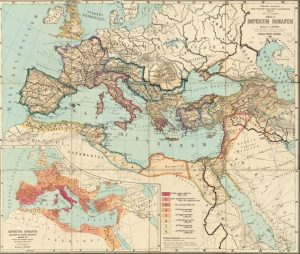Podcast episode
March 29, 2019
Episode 59: Introducing Rome

‘And when Rome falls, falls the world.’
The SHWEP has arrived at the Roman period in our chronological meanderings. While we are not primarily concerned with the history of Rome per se, the rise of the Roman state is so important to western history in general that a few things need to be said about it to contextualise pretty much all later developments in western esotericism.
The Romans conquered the entire Mediterranean region through a combination of circumstance, hard work, and sheer cussedness and aggression. But the state they created was the matrix for a flowering of culture that in many ways exceeds the sum of its parts; Rome became greater than the Romans, than the Roman empire, than any historical process. Rome became the Eternal Empire.

Works Discussed in this Episode:
The History of Rome Podcast is a completed project. If you want the blow-by-blow account of the rise and fall of western Rome, check it out! Follow this link for Episode 1.
- Faivre, A. (1992). ‘Introduction’. In: Faivre, A. & Jacob Needleman, e. (Ed.), Modern Esoteric Spirituality, SCM Press, p. xiii: ‘By the term “West” we mean the vast Græco-Roman whole within which Judaism and Christianity have always cohabited with one another, joined by Islam for several centuries.’ Listeners may wish to think about the relationship of this idea of the west with historical reality, on the one hand, and with the map of the western Roman Empire, on the other. Note that Judaism and Christianity have ‘always’ cohabited – the eternal Christian Rome is projected back in time to cover all of history – while the role of Islam – which of course does not feature in the history of the western Roman state – is elided to ‘several centuries’. If by ‘several centuries’ we mean more than a thousand years, then this is correct.
Recommended Reading:
- Edmonds, R. G., 2013. Redefining Ancient Orphism: A Study in Greek Religion. Cambridge University Press, Cambridge, UK.
- Merryman, J. H. and Pérez-Perdomo, R., 2007. The Civil Law Tradition: An Introduction to the Legal Systems of Europe and Latin America. Stanford University Press, Stanford.
- Tainter, J. A., 1990. The Collapse of Complex Societies. Cambridge University Press, Cambridge.
- Ward-Perkins, B., 2005. The Fall of Rome and the End of Civilization. Oxford University Press, Oxford.
- Ziolkowski, J. M. and Putnam, M. C. J., 2008. The Virgilian Tradition: The First Fifteen Hundred Years. Yale University Press, New Haven, CT.
Themes
Esoteric Imperialism, Katabasis, Late Antiquity, Otherworld Journeys, Rome, Virgil


Steven Borgelt
March 29, 2019
This was a fantastic episode. Another of the many that are now on the “repeated listening” list.
Thanks Earl!
Joel Kalvesmaki
May 10, 2021
In 2017 Frederic Rice argued that the concept and term “Middle Ages” was an invention of the 18th c. West, not Renaissance. Before then, world time periods shared a bipartite taxonomy: https://www.academia.edu/34903812/The_Invention_of_Byzantine_Studies_in_Early_Modern_Europe.
I believe Rice is expanding this thesis in a (currently forthcoming) book , Clark, F. Dividing Time: The Invention of Historical Periods in Early Modern Europe. Chicago: University of Chicago Press. https://dornsife.usc.edu/cf/faculty-and-staff/faculty.cfm?pid=1080378
If Rice’s thesis is correct, then the Enlightenment-period change from two-part to three-part world history may play an interesting background factor in Modern-period podcasts of SHWEP, yet to be slated.
Silvius Fabricius
March 26, 2025
The lines quoted at 32 minutes-
Hic vir, hic est, tibi quem promitti sæpius audis,
Augustus Cæsar, divi genus, aurea condet
sæcula qui rursus Latio regnata per arva
Saturno quondam, super et Garamantas et Indos
proferet imperium; iacet extra sidera tellus,
extra anni solisque vias, ubi cælifer Atlas
axem umero torquet stellis ardentibus aptum.
Note that the -as in Garamantas is unusually short, treated as if it were a Greek name.
(And the Garamantes were, alas, not eastern but southern, Berber peoples in what we now call North Africa but which was to the Romans the farthest south.)
I would think that the Holy Roman Empire deserves a mention here; but even moreso the fact that the Ottoman Emperors, conquering Constantinople, titled themselves as Cæsars of Rome. And if we take the Ottoman Empire as a continuation of the East Roman- which of course it was, among other things including the comparable honor of Caliphate- that adds a good 450 years to the time that there was continuous Roman Empire in the Mediterranean.